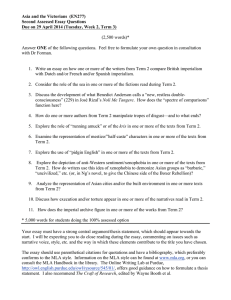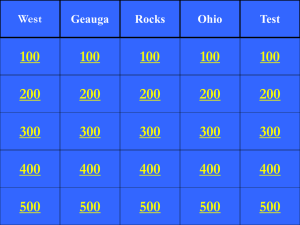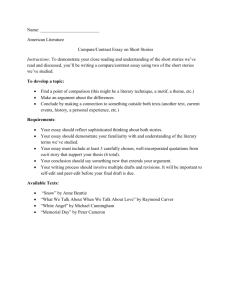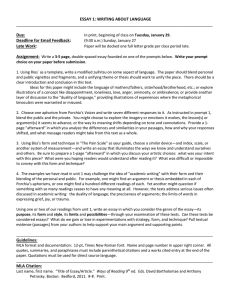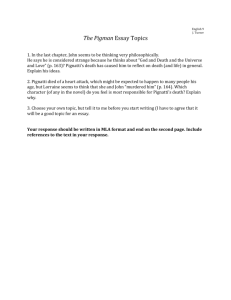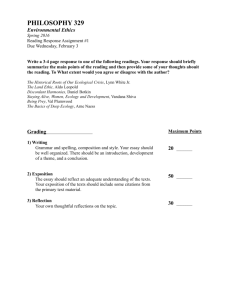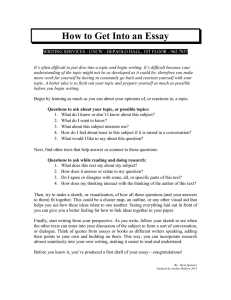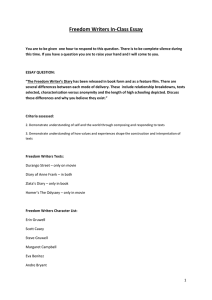Ends and Beginnings (EN278) Assessed Essay Questions
advertisement
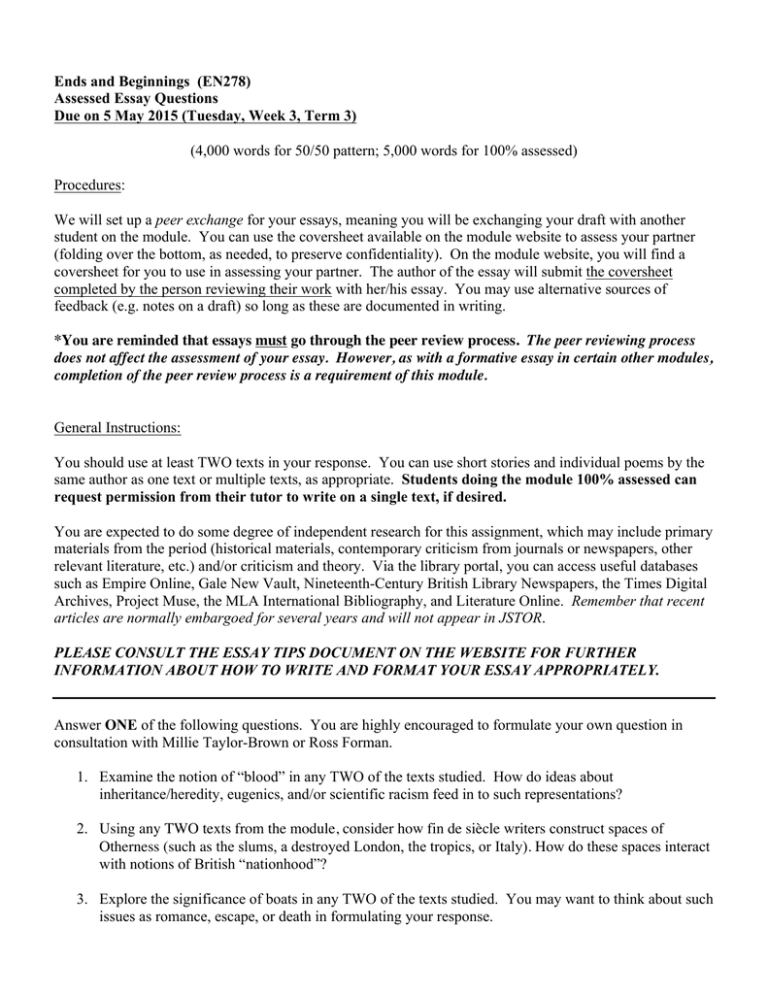
Ends and Beginnings (EN278) Assessed Essay Questions Due on 5 May 2015 (Tuesday, Week 3, Term 3) (4,000 words for 50/50 pattern; 5,000 words for 100% assessed) Procedures: We will set up a peer exchange for your essays, meaning you will be exchanging your draft with another student on the module. You can use the coversheet available on the module website to assess your partner (folding over the bottom, as needed, to preserve confidentiality). On the module website, you will find a coversheet for you to use in assessing your partner. The author of the essay will submit the coversheet completed by the person reviewing their work with her/his essay. You may use alternative sources of feedback (e.g. notes on a draft) so long as these are documented in writing. *You are reminded that essays must go through the peer review process. The peer reviewing process does not affect the assessment of your essay. However, as with a formative essay in certain other modules, completion of the peer review process is a requirement of this module. General Instructions: You should use at least TWO texts in your response. You can use short stories and individual poems by the same author as one text or multiple texts, as appropriate. Students doing the module 100% assessed can request permission from their tutor to write on a single text, if desired. You are expected to do some degree of independent research for this assignment, which may include primary materials from the period (historical materials, contemporary criticism from journals or newspapers, other relevant literature, etc.) and/or criticism and theory. Via the library portal, you can access useful databases such as Empire Online, Gale New Vault, Nineteenth-Century British Library Newspapers, the Times Digital Archives, Project Muse, the MLA International Bibliography, and Literature Online. Remember that recent articles are normally embargoed for several years and will not appear in JSTOR. PLEASE CONSULT THE ESSAY TIPS DOCUMENT ON THE WEBSITE FOR FURTHER INFORMATION ABOUT HOW TO WRITE AND FORMAT YOUR ESSAY APPROPRIATELY. Answer ONE of the following questions. You are highly encouraged to formulate your own question in consultation with Millie Taylor-Brown or Ross Forman. 1. Examine the notion of “blood” in any TWO of the texts studied. How do ideas about inheritance/heredity, eugenics, and/or scientific racism feed in to such representations? 2. Using any TWO texts from the module, consider how fin de siècle writers construct spaces of Otherness (such as the slums, a destroyed London, the tropics, or Italy). How do these spaces interact with notions of British “nationhood”? 3. Explore the significance of boats in any TWO of the texts studied. You may want to think about such issues as romance, escape, or death in formulating your response. 4. Analyze the relationship between motifs of commodity and commerce and gender relationships in any TWO texts. You may want to consider how these motifs are connected to debates about the rights of women at the fin de siècle. 5. Explore the relationship between the colonial subject and sexuality in any TWO texts on the module. To what degree is this relationship specific to the 1880-1914 era? 6. Analyze the dynamics of frustrated desire in any TWO texts from the module. 7. Discuss the embrace or rejection of “romantic love” by New Woman writers and/or New Women characters in any TWO works. 8. Explore the function of melancholy and longing in TWO of the works studied in this module. 9. How do any TWO texts from this module make use of classical mythology? Among the factors you might consider are: models of and frames for sexual desire and/or gendering; the relationship of Aesthetes and Decadents with a sense of the past; the place of the educated individual during the fin de siècle; and class. 10. “Ultimately, the bond of all companionship, whether in marriage or in friendship, is conversation, and conversation must have a common basis, and between two people of widely different culture the only common basis possible is the lowest level.” (Wilde, De Profundis 13) Evaluate this statement with respect to TWO texts studied in this module. 11. Compare the depiction of polygamy and polyandry in any TWO of the texts (e.g. Anna Lombard and Guyana Pau). 12. Examine the role of servants in any TWO of the works for this module. You will want to consider such as aspects as class, gender, and mobility in formulating your response. 13. According to Talia Schaffer in The Forgotten Female Aesthetes: Literary Culture in Late-Victorian Britain, women writers of the fin-de-siècle were “required” to achieve humour in their work, humour being considered a particularly female requirement. In addition, they were assumed to be writing self-revelations of their own subjectivity. Analyse how TWO or more women writers from the module cater to or resist these expectations. 14. Consider the treatment of death in any TWO of the works we have read. Your essay must have a strong central argument/thesis statement, which should appear towards the start. I will be expecting you to do close reading during the essay, commenting on issues such as narrative voice, style, etc. and the way in which these elements contribute to the title you have chosen. The essay should use parenthetical citations for quotations and have a bibliography, which preferably conforms to the MLA style. Information on the MLA style can be found at www.mla.org, or you can consult the MLA Handbook in the library. The Online Writing Lab at Purdue, http://owl.english.purdue.edu/owl/resource/545/01/, offers good guidance on how to formulate a thesis statement. We also recommend The Craft of Research, edited by Wayne Booth et al.

